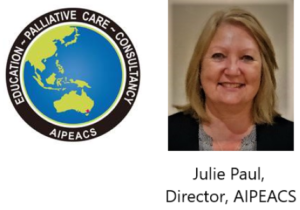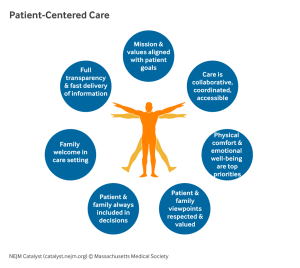
日本語訳監修: 木下佳代子 ジェックス参与
今月は、患者中心のケアと、それがなぜ緩和ケアにおいて重要であるかについて考えてみたいと思います。 本日の最新情報は、この分野の考察の一環として、答えを出すよりも多くの質問を投げかけています。 患者中心のケアについて話し合うことは、とても基本的なことのように思えますが、実際にはすべての医療専門家によってうまく行われているわけではありません。しかし、これは看護実践の極めて重要な部分であり、私たちがケアする患者や家族に大きな変化をもたらすことができます。
患者中心のケアは、看護の世界で長年使われてきた言葉です。 これは、緩和ケアにのみ適用されるものではありません。 すべての臨床の場で使用されるべきケアモデルです。
患者中心のケアには多くの定義があります。 ここでは、様々な側面について、その概要を説明します。

患者中心の治療
出展:マサチューセッツ・メディカルソサエティー
上の図を振り返って、あなたの実践に本当に患者中心の治療が取り入れられているか考えてみてください。 この側面において、あなたの実践を向上させる機会はありますか? この分野で看護を向上させるための障害はありますか、またどのように対処できますか?
あなたは、病院や近所の開業医に患者として行ったことがありますか? その経験は満足したものでしたか?
良かったと思うことは何ですか? 何が良くなかったのでしょうか?
自分の経験を患者中心のケアの原則と関連づけることができますか? 患者中心のケアの重要性を本当に理解するためには、医療従事者自身が患者になることが必要なのはなぜでしょうか。
私は、先月から様々な医療分野の専門家に診てもらっています。 その際、私に提供されたケアは、ほとんどの場合、患者中心ではありませんでした。 このような経験をより良いものにするためにはどうしたらよいかを考えてみました。 結局のところ、それはコミュニケーションの問題に関するものでした。臨床医が時間をかけるのではなく、患者(私)の視点から経験を活かすために、別の方法をとるべきだという結論に達しました。 そして、それはきっと臨床医にとっても良い経験になるはずです。 自分が患者としてケアされたいように患者さんに接すれば、間違いなく診療も変わってくるはずです。 あなたはどのようにお考えですか?
患者さんやご家族の視点から、なぜ患者さん中心の治療が重要なのでしょうか? 健康上の成果が向上することが分かっているからです。
ケアが理解され守られて、文化的に適切な方法で提供される可能性が高くなります。 患者さん・ご家族と医療従事者の間のコミュニケーションも大きく向上します。
その他の有効な成果としては、以下のようなものがあります。
- 情報がタイムリーに共有され、患者や家族が十分な情報を得た上で意思決定を行うことができる
- 良好な健康状態を促進する
- 患者や家族に力を与える/患者・家族と看護師の間に有意義な関係をもたらす
- 自立を支援する
- 尊厳を高める/QOLを向上させる
- 患者さんに力を与える/患者さんの選択を尊重する/共有の意思決定/ケア目標の合意をもたらす
私たちは、ケアは患者さんやご家族とのパートナーシップのもとに提供されるべきであると本当に信じていますか? 私たちは、これを臨床の場でどのように示していますか?
私たちの組織の方針と実践は、患者中心のケアを提供する方法が確立されていますか? あなたがケアする患者さんのために、日々変化をもたらすために、個人として、また病棟レベルで何ができるでしょうか?
今月の最新情報は、あまりに単純すぎるように思えますが、私たちのアプローチが、正しく行われれば、大きな変化を生み出すことができる良い機会だと思います。
あなたのご意見をお聞かせください。
この分野のさらなる読み物としては
- 人中心のプライマリケア指標の日本語版の開発と検証 – 金子ら BMC Primary Care (2022) 23:112
https://doi.org/10.1186/s12875-022-01726-7
(ページ右側のリンクをクリックすると、論文のPDF版をダウンロードできます。)
https://bmcprimcare.biomedcentral.com/articles/10.1186/s12875-022-01726-7
- 日豪のがん外来患者における患者中心ケアの経験。Cross sectional studyの結果, Journal of patientExperience, Volume 8, 2021, M Carey, M Uchida, A Zucca, T Okuyama, T Akeshi, R Sanson-Fisher
https://journals.sagepub.com/doi/full/10.1177/23743735211007690
( ページの上部にあるリンクをクリックすると、記事のpdf版をダウンロードできます)
- 日本の在宅医療患者における患者中心ケア、事前ケア計画、治療嗜好、林 悟、白髭 佑、次橋 宇、飯田 寛、廣瀬 正、安宅 正、
栗田 直樹、2021年8月
https://www.medrxiv.org/content/10.1101/2021.08.13.21261948v1.full.pdf
- 日本人患者のPatient Centered medicineに対する好みと患者のかかりつけ医に対する満足度との関連, 草場 哲史,
家庭医学専攻臨床科学修士学位の要件の一部を満たして提出された論文, 2019年
https://ir.lib.uwo.ca/cgi/viewcontent.cgi?article=8913&context=etd
患者中心ケアに関連する記事は多数あります。 追加情報をご希望の方は、メールでご連絡いただければ、追加のリンクを転送します。
もし、追加情報が必要な分野があれば、julie@palliativeeducation.com までリクエスト(英語または日本語)を転送していただければ、確実に議論させていただきます。
あなたがどのように過ごしているか教えてください。 緩和ケアに関する皆さんの考えや経験を共有することはとても楽しいことで、私たちはお互いから学び続けることができます。
来月のキャッチアップを楽しみにしています。
ごきげんよう、ジュリー
事務局より:
ジュリーさんは、皆様からの感想、質問などをお待ちしています。
-
Disclaimer: September 2022 免責条項:
Australian International Palliative Education and Consultancy Services (AIPEACS) は、Julie’s Corner シリーズ内の内容につき正確な情報の提供に細心の注意を注いでいますが、特にある事柄についての専門的意見を提供するものではありません。このシリーズに含まれる情報は、独立した専門家の見解に取って代るものではありません。また、医療上の助言として利用したり、何らかの疾患の治療、手当、又は、予防のために使用されるものではありません。
AIPEACSは、このシリーズにより提供される情報の利用、依存によるいかなる法的責任、怪我、紛失、損害については、責任は負いません 。
Australian International Palliative Education and Consultancy Services Pty. Ltd -
Julie’s Update: SEPTEMBER 2022 (原文)
-
This month I would like us to reflect on patient centred care and why it is important in palliative care. Today’s update poses more questions than providing answers as part of our reflection in this area. Discussing patient centered care may seem very basic, however we know in practice this is not done well by all health professionals. Yet it is a pivotal part of nursing practice that can make such a difference for the patients and families we care for.
Patient centred care is a phrase that has been used for many years in nursing. It is not only applicable to palliative care. It is a model of care that should be used in all clinical environments.
There are many definitions of patient centred care. Here is one that provides a good overview of the various aspects:
患者中心の治療
出展:マサチューセッツ・メディカルソサエティー
患者中心の治療

In reflecting on the above diagram, consider do you truly incorporate patient centred care in your practice? Are there opportunities to enhance your practice in this aspect? Are there any barriers for you to improve your practice in this area and how can they be managed?
Have you ever been a patient yourself, either in hospital or even with your local doctor? Were you satisfied with the experience? What could have made it better? What made it not so good? Can you relate your experience to the principles of patient centred care? I am wondering why it often takes for a health professional to be a patient themselves to truly understand the importance of patient centred care.
I have recently seen a number of health professionals over the last month from various health disciplines. The care provided to me has not patient centered for the majority of the visits. I have pondered on what would have made these experiences better. Ultimately it has mostly been related to communication style. I have come to the conclusion it would not take extra time on the clinician’s part but a different way of doing things to enhance the experience from the patient’s (my) perspective. I am sure it would also have an improved experience for the clinician as well. If we treat patients how we would want to be treated, it would definitely change our practice. What are your thoughts?
Why is patient centred care important from the patient and family perspective? We know there will be improved health outcomes. Care is more likely to be understood and followed and be provided in a culturally appropriate way. Communication between the patient/ family and the health professionals is greatly enhanced.
Other positive outcomes include:
- Information is shared in a timely manner / enables patients and families to make informed decisions
- Promotes positive well-being
- Empowering for patients and family / results in meaningful relationships between patient/family and nurse
- Supports independence
- Enhances dignity / improves quality of life
- Empowers patient’s / honours choice / results in shared decision making / and agreed goals of care
Do we truly believe that care should be provided in partnership with the patient and their family? How do we demonstrate this in our clinical practice?
Are our organisational policies and processes established in a way that supports us to provide patient centred care?
What can you do individually and on a ward level to make a difference every day for the patients you care for?
This month’s update almost seems too simplistic, however it is a good reminder to us all that our approach to patients and families can make a significant difference, if we get it right!
Let me know your thoughts.
For further reading on this area:
- Development and validation of a Japanese version of the person-centred primary care measure – Kaneko et al. BMC Primary Care (2022) 23:112 https://doi.org/10.1186/s12875-022-01726-7 ( click on the link on the right hand side of the page to download a pdf version of the article) https://bmcprimcare.biomedcentral.com/articles/10.1186/s12875-022-01726-7
- Experiences of Patient Centred Care Among Japanese and Australian Cancer Outpatients: Results of a cross sectional study, Journal of patient Experience, Volume 8, 2021, M Carey, M Uchida, A Zucca, T Okuyama, T Akeshi, R Sanson-Fisher https://journals.sagepub.com/doi/full/10.1177/23743735211007690 ( click on link at the top of the page for a pdf version of the article)
- Patient-centered care, advance care planning, and treatment preferences among home medical care patient in Japan, S Hayashi, Y Shirahige, U Tsugihashi, H Iida, M Hirose, M Yasunake, N Kurita, August 2021 https://www.medrxiv.org/content/10.1101/2021.08.13.21261948v1.full.pdf
- Japanese patients’ preference for Patient Centered medicine and its association with the satisfaction of patients with their family physicians, Tesshu Kusaba, A thesis submitted in partial fulfilment of the requirements for the Master of Clinical Science degree in Family Medicine, 2019 https://ir.lib.uwo.ca/cgi/viewcontent.cgi?article=8913&context=etd
There are many articles related to patient centred care. If you would like additional information, please email me and I can forward you some additional links.
If you have any particular areas you would like additional information on, please forward your request (either in English or Japanese) to julie@palliativeeducation.com and I will ensure this is discussed.
Please let me know how you are going. I enjoy sharing your thoughts and experiences on palliative care, so that we can continue to learn from each other.
I am looking forward to our next month’s catch up.
Stay safe Julie
